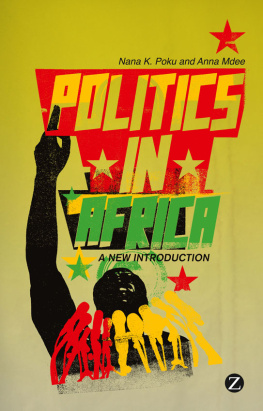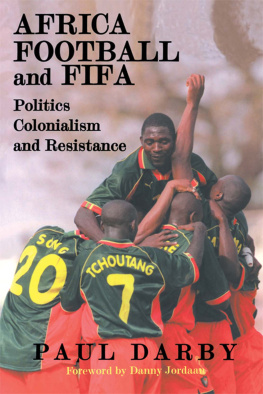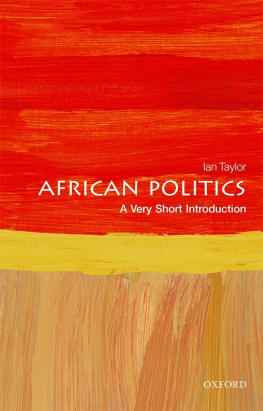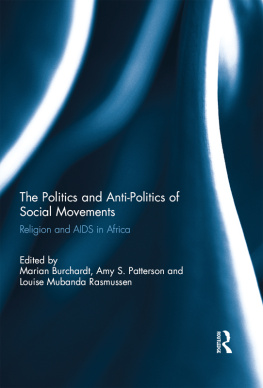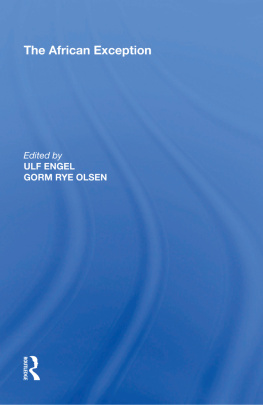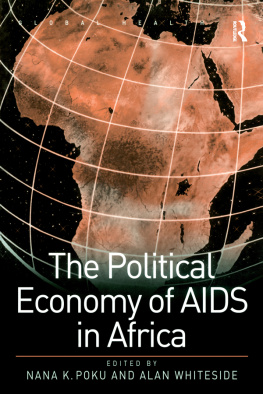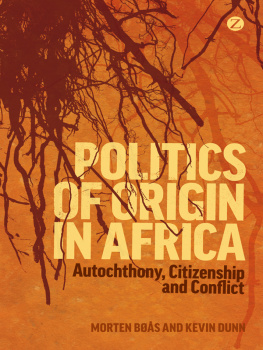
About the authors
Nana K. Poku is the John Ferguson Professor of African Studies at the University of Bradford. He joined the universitys Peace Studies Department in 2006 from the United Nations, where he held the posts of senior policy adviser to the executive secretary of the Economic Commission for Africa (ECA) and director of research for the Commission on HIV/AIDS and Governance in Africa (UN-CHGA). He currently serves as a special adviser to the government of Ghana on PRSP and health issues and has led fourteen appraisal missions in eleven countries in Africa. He has also been an adviser to the European Union, the World Bank, the Organisation for Economic Co-operation and Development, the World Health Organization and the United Nations Development Programme, among other international agencies.
Anna Mdee is deputy director of the John and Elnora Ferguson Centre for African Studies (JEFCAS) and also Associate Dean (Teaching & Learning) in the School of Social and International Studies at the University of Bradford. Her research has focused on aid policy, civil society and community-driven development in East and southern Africa. She is currently working on developing strategic partnerships with African universities to build long-term initiatives for strengthening development research and teaching.
POLITICS IN AFRICA
a new introduction
Nana K. Poku and Anna Mdee

Zed Books
LONDON NEW YORK
Politics in Africa: a new introduction was first published in 2011 by Zed Books Ltd, 7 Cynthia Street, London N1 9JF , UK and Room 400, 175 Fifth Avenue, New York, NY 10010, USA
This ebook edition was first published in 2013
www.zedbooks.co.uk
Copyright Nana K. Poku and Anna Mdee 2011
The rights of Nana K. Poku and Anna Mdee to be identified as the authors of this work have been asserted by them in accordance with the Copyright, Designs and Patents Act, 1988
Set in Monotype Sabon and Gill Sans Heavy by Ewan Smith, London
Index: <>
Cover designed by Stuart Tolley
All rights reserved. No part of this publication may be reproduced, stored in a retrieval system or transmitted in any form or by any means, electronic, mechanical, photocopying or otherwise, without the prior permission of Zed Books Ltd.
A catalogue record for this book is available from the British Library
Library of Congress Cataloging in Publication Data available
ISBN: 978-1-78032-931-4
Contents
Figures and tables
Figures
Tables
Abbreviations
| AIDS | Acquired Immunodeficiency Syndrome |
| AISPs | Agricultural Input Subsidies Programmes |
| ANC | African National Congress |
| AU | African Union |
| CAADP | Comprehensive Africa Agriculture Development Programme |
| CEDAW | (UN) Convention on the Elimination of All Forms of Discrimination against Women |
| FAO | Food and Agriculture Organization of the United Nations |
| GAD | Gender and Development |
| GDP | gross domestic product |
| GFATM | Global Fund to Fight AIDS, Tuberculosis and Malaria |
| GM | genetically modified |
| GNP | gross national product |
| HIPC | Heavily Indebted Poor Countries |
| HIV | Human Immunodeficiency Virus |
| IFPRI | International Food Policy Research Institute |
| IMF | International Monetary Fund |
| MDGs | Millennium Development Goals |
| NEPAD | New Partnership for Africas Development |
| NGO | non-governmental organization |
| OECD | Organisation for Economic Co-operation and Development |
| PEPFAR | Presidents Emergency Plan for AIDS Relief (United States) |
| SAP | structural adjustment programme |
| SSA | sub-Saharan Africa |
| STI | sexually transmitted infection |
| UN | United Nations |
| UNCTAD | United Nations Conference on Trade and Development |
| WB | World Bank |
| WID | Women in Development |
Acknowledgements
Putting together this book has not been an easy process and we must relay our thanks to those who have supported us in bringing it to completion. Much appreciation is due to Ken Barlow of Zed Books for patiently cajoling us to make progress despite endless missed deadlines, to Jacqueline Therkelsen for tirelessly tidying up our referencing and textual inconsistencies, and also to Lisa Thorley and Isaac Kankam-Boadu for the detailed background research which underpins .
This book is dedicated to Professor Tony Barnett for his contribution to the study of African societies, politics and culture.
Introduction
Self-determination, prosperity and progress this was the dream of African independence. For a people who had for many centuries been little more than objects of external rivalries, independence was an opportunity to prove, in the words of Habib Bourguiba, Tunisias head of government in 1961, that the African was capable of running his own affairs; fighting his own battles and developing his own people ().
The wheels of fate did not permit Nkrumah a full decade of power. By the time of his political demise in 1966, Ghana was far from being a paradise, locked, as it was, into a pattern of corruption, stagnation and conflict, which persists to the present. Today, it is hard to escape the painful reality that all else has not followed. The early optimism has long faded, the enormous challenge of self-government, nation-building and development assuming ever more challenging realities in a fundamentally transformed continental and global landscape. In the interim, Claude Ake offers the following indictment of post-colonial rule: indigenous leaders are responsible for a perverse alienation, the delinking of leaders from followers, a weak sense of national identity ). The resulting social decay presents a dramatic picture of insecurity for ordinary people in circumstances where states have proved either unable to provide their protection or in some cases were the principal sources of violence.
A common theme runs through virtually all the predictions made of the continent. The vast landmass appears to be cited in order to stress its transience or decrepitude, as if some curse of dubious scientific basis had been laid on political analysis of the whole continent. Ignored by theoreticians and discredited by militant attackers of imperialism whose dialectical reasoning proved Africas impotence in global politics, the continent now appears to exist only as a reminder of the failures of indigenous rule. In retrospect, even the colonial regimes have gained a certain measure of respect: Johnson U. J. Asiegbu, for example, found it possible to contrast the patriotism and probity, [] self-discipline and other remarkable ideals of public responsibility of the colonial period with the bad and dishonest examples, [] the criminal wastage, the fraudulent and selfish mismanagement of the continents resources practised by the new predatory elites in post-colonial Africa ().
There is no denying the facts to which these conclusions speak: to the extent that international calculations of national poverty indices can be trusted, Africans are not yet the poorest people in the world. Only 23 per cent of the continents population of 850 million were classified by the World Bank as poor in 2010; this proportion is nowhere close to the 40 per cent poverty-afflicted population among Asias 2.2 billion people (). Yet Africas consistently declining rates of economic productivity and surging population growth portend deepening impoverishment, compared with South Asia, where an increase in per capita income is already evident. Moreover, for most people, the heart-rending pictures of starving children in Ethiopia or young people suffering from the debilitating and dehumanizing effects of the HI virus (HIV), the atrocities of Darfur or Rwanda, the absurd posturing of Robert Mugabe or Omar Hassan Ahmad al-Bashir make up the primary picture of the continent.
Next page
